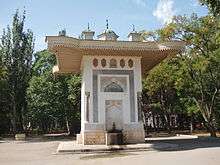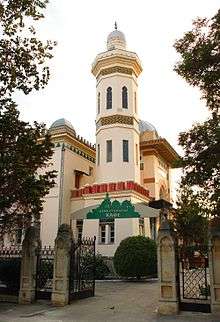Feodosiya
Feodosiya (Russian: Феодосия) is a beautiful, quaint little resort town on the Black Sea coast in Crimea.

As a highly prized getaway spot for Russian-speaking vacationers, Feodosiya's population swells in the late spring, summer, and early fall months.
Feodosiya is 100km to the east of Simferopol. From the outskirts it looks like an urban industrial disaster but once past the factories it has a very nice old town. Very similar to Odessa in architecture but on a smaller scale.
Understand
The city was founded as Theodosia (Θεοδοσία) by Greek colonists from Miletos in the 6th century BC, destroyed by the Huns in the 4th century AD, refounded and remained a minor village for much of the next nine hundred years. It was at times part of the sphere of influence of the Khazars (excavations have revealed Khazar artifacts dating back to the 9th century) and of the Byzantine Empire. Like the rest of Crimea, this village fell under the domination of the Kipchaks, after which was conquered by the Mongols in the 1230s.
In the late 13th century, traders from the Republic of Genoa arrived and purchased the city from the ruling Golden Horde. They established a flourishing trading settlement called Caffa (or Kaffa), which virtually monopolized trade in the Black Sea region and served as a major port and administrative center for the Genoese settlements around the Sea. It came to house one of Europe's biggest slave markets. Between 1204–1261 and again in 1296–1307, the city of Caffa was ruled by the Republic of Venice.
It is believed that the devastating pandemic remembered under the name of Black Death entered Europe for the first time via Caffa in 1347, through the movements of the Golden Horde. After a protracted siege during which the Mongol army was reportedly withering from the disease, they catapulted the infected corpses over the city walls, infecting the inhabitants, in one of the first cases of biological warfare. Fleeing inhabitants may have carried the disease back to Italy, causing its spread across Europe.
In 1615, when Caffa was part of the Ottoman Empire, the Zaporozhian Cossacks destroyed the Turkish fleet and captured the city. However, Ottoman control only ceased when the expanding Russian Empire conquered the whole Crimea in 1783. It was renamed Feodosiya (Феодосия), a Russian version of the ancient Greek name.
The city was occupied by the forces of Nazi Germany during World War II, sustaining significant damage in the process.
Get in
There are many buses that leave from the train station in Simferopol going to Feodosiya, almost every hour. You can also take the train.
Get around
It's not that big of a city, so mostly you can walk or take the city buses.
See

- There is an old Genoan fortress in the city.
- Stamboli's palace is the former palace of a very wealthy tobacco merchant.
- The Armenian church is worth seeing.
- Most of the old town, much like the city of Odessa is filled with what used to be very large wealthy houses that have fallen into a state of total decay. You may enjoy a long walk through the city just observing the stray cats, the broad streets over grown with trees and vines or the abandoned houses.
- In the hills on the east side of the city there is an abandoned Jewish cemetery which, though difficult to find is very interesting to see. On the way up to the cemetery you'll pass through some very poor (but safe and beautiful) neighborhoods. As you near the cemetery you'll notice that some of the houses have included the former headstones from the cemetery as decorations.
- The city center has some great communist statues.
Do
Buy
Eat
Drink
Sleep
- Feodosia Apartment, Revolutsionnaya 16/7, ☎ +38 097 375 1552. The recently renovated Feodosia Apartment is situated in a peaceful area close to the beach&town center. Feodosia Apartment's convenient location attracts budget hotel and youth hostel guests, individual travelers as well as business visitors.
Go next
Also worth a visit is the nearby seaside enclave of Koktebel.